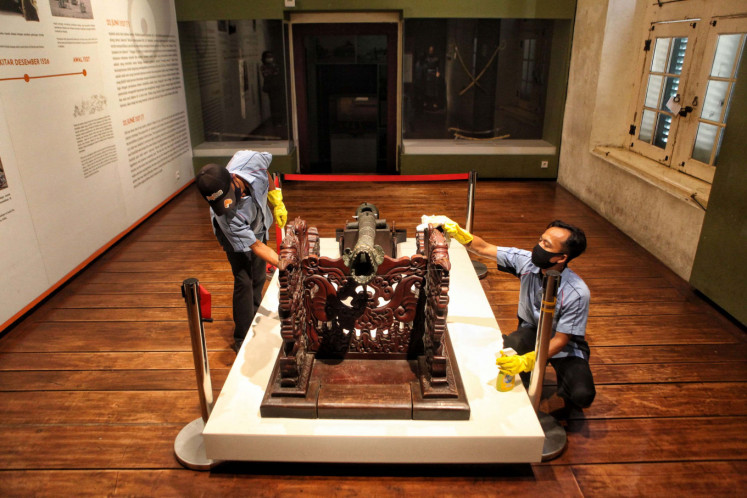How gender norms hamper working women
Community-based childcare services and facilities can go some way to relieve the double burden of women, but cannot address the gender norms, whether religious, cultural or legislative, that create obstacles for women looking to pursue a career.
Change text size
Gift Premium Articles
to Anyone

A
survey we conducted in four urban areas last year caught us by surprise, as it disclosed a gloomy trend among working women. While respondents acknowledged a need to work as a means of self-actualization, they were aware of the limitations for women who pursued careers.
The survey was conducted in Jakarta, Depok, Bekasi and Bandung, involving 600 female and male respondents from various age groups and 19 informants for in-depth case studies. It aimed to ascertain their views about obstacles for women working outside the home, whether in formal or informal work outside the home.
Among the 216 young respondents, female respondents had positive aspirations about working women. They believed that work was a means for self-actualization, actualizing their education, and a way to support their parents and later, to “help” their husbands.
However, they acknowledged concerns that once they were married, they would face obstacles and restrictions concerning working hours, working at night, dress codes and workplaces located far from or outside their city of resident, which would force them to live apart from their families.
More generally, they were afraid of physical and symbolic obstacles related to gender norms, such as distant workplaces, sharing the workplace with men, lack of childcare facilities, unsupportive husbands or families who asked them to prioritize their children, or lack of jobs that suited their character as women.
It was surprising, however, that 28 percent of young male respondents aged 18-22 preferred their future wives to stay at home, work from home, or if unnecessary, do no other work than taking care of the household. This was even more surprising because in general, the respondents’ mothers were the breadwinners with either formal or non-formal jobs, but none working from home. When we explored this in depth, these youths had arguments for which solutions needed to be considered.
According to them, when women worked, like their mothers, nobody would care for the children. This was because whether their fathers worked or were unemployed, mothers (women) were still the primary carers of children. These youths believed that, according to religious norms, women were not responsible for earning a living.
Some of them believed that work was neutral ground for both men and women. However, because the burden of caring for children and the home fell to women, they should stay at home or work from home to avoid committing the sin of neglecting their responsibilities.
The views of these young male adults confirmed the results of the survey and in-depth interviews. All 600 respondents – working men, working women, unemployed men and unemployed women – agreed that there was a stigma attached to working women. The types of jobs available to them and their marital status made them vulnerable to negative stigma.
The types of jobs that suit the feminine character are teaching, healthcare services, administration and other service jobs. The appropriate time for women to work is daylight hours, and their workplace should not be located too far from home.
The respondents generally did not accept female leaders, such as in government or corporations, particularly if a male worker with the same skills and knowledge were available; they preferred male leaders. Their reason was that women were not allowed to be imam (leaders of prayer in Islam).
Meanwhile, young female respondents said there were many women whom they saw as capable of holding leadership posts, but they still agreed that women were not allowed to be imam. Their question was whether a leader in public spaces needed to qualify as imam.
Another stigma working women faced was that they should take the blame for any problems that arose in the domestic realm, such as a child who falls ill or engages in delinquent behavior because of a lack of parental care, even a husband’s extramarital relationship.
From the results of survey and the in-depth interviews, it is evident that there are problems in the gender norms applied to working women. Yet, work has never been a taboo for Indonesian women. The problem is that the obligation to support the family rests with husbands, while wives are expected to prioritize household work, regardless of their employment status.
This norm of women’s double burden arises from an interpretation of religion, cultural practices and even laws that define the household roles of husbands and wives, such as Article 31 of Marriage Law No. 1/1974. Furthermore, Article 79 of the Compilation of Islamic Laws (KHI) says: “the man is the head of the household, while the woman is a housewife”. The recent rise of religious views as identity politics has only strengthened this view.
The gender norms regarding working women create a series of unwritten rules that regulate or determine limits on working women. These limitations require women to always consider various aspects related to religious teachings and social norms before they decide to work or pursue a career. These restrictions, too, determine a woman’s decision to resign from a job, especially when they are married and have children.
The obstacles facing working women need to be addressed. Work opportunities exist for women, but the availability of social infrastructure that can replace the traditional roles of women is another issue.
The government, through regulations, already obliges companies to provide childcare facilities. Technically, however, this is very difficult to implement, particularly for supporting women who live far from the workplace. The costs of building and running childcare facilities are also a consideration.
Working women also need social support at the community level that will allow them to work and to take care of their children. This support includes safe places in all environments for children to play and do sports under inherent supervision, especially to prevent sexual violence and exposure to cigarettes and drugs.
In the past, villages provided madrasahs, prayer halls, soccer fields and large open spaces that children could access for play. Nowadays, places of worship cannot always be used as child-friendly spaces for playing and interaction, because the function of such spaces has narrowed to accommodate only religious studies or prayer.
Apart from the COVID-19 restrictions, there is a need for a community-level social infrastructure that can support women in continuing to work without excessive pressure to care for their homes and children.
The availability of community-based childcare services and social infrastructure can help ease the double burden of women when working outside the home. Above all, this will require political and religious support, in realizing work as a right and support that is available to make life easier for working women.
***
The writer is a researcher at Rumah KitaB and a program manager at Yayasan Rumah KitaB.









